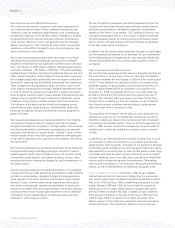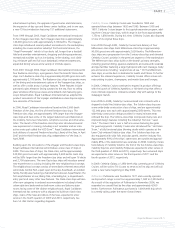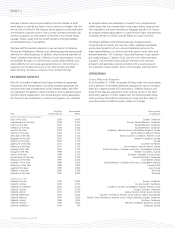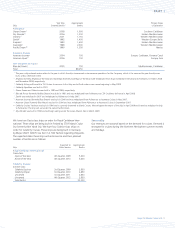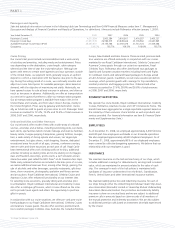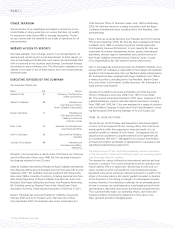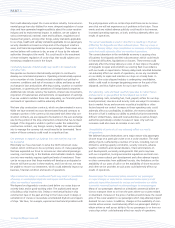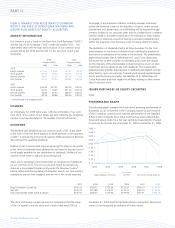Royal Caribbean Cruise Lines 2008 Annual Report Download - page 27
Download and view the complete annual report
Please find page 27 of the 2008 Royal Caribbean Cruise Lines annual report below. You can navigate through the pages in the report by either clicking on the pages listed below, or by using the keyword search tool below to find specific information within the annual report.
Royal Caribbean Cruises Ltd. 11
PART I
We maintain war risk insurance for our ships, including terrorist risk
insurance, on each ship through a Norwegian war risk insurance
organization. This coverage includes coverage for physical damage to
the ship which is not covered under the hull policies as a result of war
exclusion clauses in such hull policies. We also maintain protection and
indemnity war risk coverage for risks that would be excluded by the
rules of the indemnity insurance organizations, subject to certain limita-
tions. Consistent with most marine war risk policies, under the terms
of our war risk insurance coverage, underwriters can give seven days
notice to us that the policy will be canceled and reinstated at higher
premium rates.
We also maintain insurance coverage for certain events, which would
result in a delayed delivery of our contracted new ships, which we
normally place starting approximately two years prior to the scheduled
delivery dates.
Insurance coverage for shoreside property, shipboard inventory, and
general liability risks are maintained with insurance underwriters in
the United States and the United Kingdom.
We do not carry business interruption insurance for our ships nor
our shoreside operations based on our evaluation of the risks involved
and protective measures already in place, as compared to the cost
of insurance.
All insurance coverage is subject to certain limitations, exclusions and
deductible levels. In addition, in certain circumstances, we co-insure a
portion of these risks. Premiums charged by insurance carriers, includ-
ing carriers in the maritime insurance industry, increase or decrease
from time to time and tend to be cyclical in nature. These cycles are
impacted both by our own loss experience and by losses incurred
in direct and reinsurance markets. We historically have been able
to obtain insurance coverage in amounts and at premiums we have
deemed to be commercially acceptable. No assurance can be given
that affordable and secure insurance markets will be available to us
in the future, particularly for war risk insurance.
The Athens Convention relating to the Carriage of Passengers and their
Luggage by Sea (1974) and the 1976 Protocol to the Athens Conven-
tion are generally applicable to passenger ships. The United States has
not ratified the Athens Convention; however, with limited exceptions,
the 1976 Athens Convention Protocol may be contractually enforced
with respect to those of our cruises that do not call at a United States
port. The International Maritime Organization Diplomatic Conference
agreed upon a new Protocol to the Athens Convention on November 1,
2002. The 2002 Protocol, which is not yet in force, substantially increases
the level of compulsory insurance, which must be maintained by pas-
senger ship operators. No assurance can be given as to if or when the
2002 Protocol will come into force. If in force, no assurance can be
given that affordable and secure insurance markets will be available
to provide the level of coverage required under the 2002 Protocol.
TRADEMARKS
We own a number of registered trademarks related to the Royal Carib-
bean International, Celebrity Cruises, Pullmantur, Azamara Cruises
and CDF Croisières de France cruise brands. The registered trademarks
include the name “Royal Caribbean” and its crown and anchor logo,
the name “Celebrity Cruises” and its “X” logo, the names “Pullman-
tur Cruises” and “Pullmantur” and their logos, the name “Azamara
Cruises” and its logo, the name “CDF Croisières de France” and its
logo, and the names of various cruise ships. We believe trademarks
related to the Royal Caribbean International, Celebrity Cruises and Pull-
mantur Cruises brands are widely recognized throughout the world and
have considerable value. We also believe trademarks related to our new
brands, Azamara Cruises and CDF Croisières de France, have received
recent recognition throughout the world and have significant value.
REGULATION
Our ships are regulated by various international, national, state and
local laws, regulations and treaties in force in the jurisdictions in which
they operate. In addition, our ships are registered in the Bahamas,
Malta or in the case of Celebrity Xpedition, Ecuador. Each ship is
subject to regulations issued by its country of registry, including reg-
ulations issued pursuant to international treaties governing the safety
of the ship and its passengers. Each country of registry conducts
periodic inspections to verify compliance with these regulations. Ships
operating out of United States ports are subject to inspection by the
United States Coast Guard for compliance with international treaties
and by the United States Public Health Service for sanitary conditions.
Our ships are also subject to similar inspections pursuant to the laws
and regulations of various other countries our ships visit.
Our ships are required to comply with international safety standards
defined in the Safety of Life at Sea Convention. The Safety of Life at
Sea Convention standards are revised from time to time and the most
recent modifications are being phased in through 2010. We do not
anticipate that we will be required to make any material expenditures
in order to comply with these rules.
We are required to obtain certificates from the United States Federal
Maritime Commission relating to our ability to satisfy liability in cases
of non-performance of obligations to passengers, as well as casualty
and personal injury. Pursuant to the United States Federal Maritime
Commission regulations, we arrange through our insurers for the pro-
vision of guarantees aggregating $45.0 million for our ship-operating
companies as a condition to obtaining the required certificates. The
United States Federal Maritime Commission has proposed various
revisions to the financial responsibility regulations, which could require
us to significantly increase the amount of our bonds and accordingly
increase our costs of compliance.
We are also required by the United Kingdom and other jurisdictions to
establish our financial responsibility for any liability resulting from the
non-performance of our obligations to passengers from these jurisdic-
tions. In the United Kingdom, we are currently required by the United
Kingdom Passenger Shipping Association to provide performance
bonds totaling approximately £42.0 million. We are also required to
pay to the United Kingdom Civil Aviation Authority a non-refundable
tax of £1 per passenger.
We are subject to various United States and international laws and
regulations relating to environmental protection. Under such laws
and regulations, we are prohibited from, among other things, dis-
charging certain materials, such as petrochemicals and plastics, into
the waterways. We have made, and will continue to make, capital and
other expenditures to comply with environmental laws and regulations.





